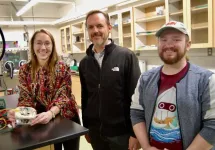(Press-News.org) A new article in JBMR Plus, published by Oxford University Press, indicates that patient survival rates after hip or other bone fractures can be very poor. While patients and their families may dismiss a fracture as a minor injury, survival rates can be lower than those for many types of cancer.
Scientists have gathered a body of evidence about mortality outcomes in patients over 50, but survival rates following bone fractures are not often included in the statistics available to patients or caregivers. The aim of this current real-world population-based study of close to 100,000 subjects was to show the post-fracture prognosis in people over 65 years by examining the overall survival by gender, age groups, and types of fractures, using the database of the Ontario, Canada public healthcare system.
In the entire fracture cohort over 65, less than a third of men and half of women survived five years after a hip fracture, with overall survival rates being marginally better following vertebral fracture. The oldest patients, those over 85, had the worst prognosis. Female patients tended to have better post-fracture survival than men, but had a significantly higher risk for getting a fracture in the first place. The paper emphasizes that the greatest reduction in survival in both genders occurred within the initial month after a fracture, indicating a high relative impact of short-term factors. This suggests the most critical period for doctors to intervene to improve patient prognoses is immediately after a fracture.
The paper notes that the five-year survival rates after a diagnosis of different types of cancer relevant to older adults are as follows: 64% in patients 60 to 79 years with any type of cancer, 43% in those over 80 with any type of cancer, 94% in men of any age with prostate cancer, and 89% in women (any age) with breast cancer. Therefore, survival outcomes for fractures in older adults are comparable to or worse than those seen for patients afflicted by some common types of cancer.
‘’This large study of Canadians over 65 strongly demonstrates that survival most dramatically declined within one month after most types of fracture, with a five-year survival being similar to or worse than some common cancers,” said the paper’s lead author, Jacques Brown. “These observations highlight the urgency to change our attitude towards these patients and offer them secondary prevention interventions before hospital discharge, as recommended by the American Society for Bone and Mineral Research.”
The paper, “Post-fracture Survival in a Population-Based Study of Adults Aged ≥66 Years: A Call to Action at Hospital Discharge,” is available at https://doi.org/10.1093/jbmrpl/ziae002.
Direct correspondence to:
Jacques P. Brown
CHU de Québec Research Centre and Laval University
2705 Boulevard Laurier, TR-83
Québec, QC, CANADA
jacques.brown@crchudequebec.ulaval.ca
To request a copy of the study, please contact:
Daniel Luzer
daniel.luzer@oup.com
END
Survival rates after hip or spine fracture worse than for many cancers
2024-04-09
ELSE PRESS RELEASES FROM THIS DATE:
Beating back bitter taste in medicine
2024-04-09
PHILADELPHIA (April 9, 2024) – The bitter taste of certain drugs is a barrier to taking some medications as prescribed, especially for people who are particularly sensitive to bitter taste. Published in Clinical Therapeutics, a team from the Monell Chemical Senses Center found that the diabetes drug rosiglitazone could partially block the bitter taste of some especially bad-tasting medications. Rosiglitazone could be added in small doses to other medicines, to make them less bitter and taste better.
This result provided new information. “To our knowledge, there are no previous reports on the bitter-blocking effect of this diabetes drug,” ...
Heart regeneration pioneer to join UW–Madison, Morgridge Institute
2024-04-09
04/09/2024
CONTACT: Deneen Wellik, wellik@wisc.edu
Heart regeneration pioneer to join UW–Madison, Morgridge Institute
MADISON — A biologist who explores the potential life-saving mechanisms of how organisms regenerate damaged heart and spinal cord tissue will join the University of Wisconsin–Madison and the Morgridge Institute for Research this fall.
Kenneth Poss, presently the James B. Duke Professor of Regenerative Biology at Duke University, explores a research area that has grown ...
Can the bias in algorithms help us see our own?
2024-04-09
Algorithms were supposed to make our lives easier and fairer: help us find the best job applicants, help judges impartially assess the risks of bail and bond decisions, and ensure that healthcare is delivered to the patients with the greatest need. By now, though, we know that algorithms can be just as biased as the human decision-makers they inform and replace.
What if that weren’t a bad thing?
New research by Carey Morewedge, a Boston University Questrom School of Business professor of marketing and Everett W. Lord Distinguished Faculty Scholar, found that people recognize more of their biases in algorithms’ decisions ...
This device gathers, stores electricity in remote settings
2024-04-09
Today wirelessly connected devices are performing an expanding array of applications, such as monitoring the condition of engines and machinery and remote sensing in agricultural settings. Systems known as the “Internet of Things” (IoT), hold much potential for improving the efficiency and safety of the equipment.
Yet stumbling blocks remain for IoT, thwarting many potential applications. How do you power these devices in situations where and when reliable electrical sources are not practically available?
Research from the University of Utah’s College of Engineering points to a possible solution in the form of a novel type of battery called ...
AACR: Video educates and connects men to prostate cancer screening options
2024-04-09
SAN DIEGO – As part of a comprehensive effort to improve cancer screenings among diverse communities, Penn Medicine’s Abramson Cancer Center (ACC) Community Outreach and Engagement team developed a culturally sensitive educational video to address prostate cancer screening disparities. In findings shared today at the American Association for Cancer Research (AACR) Annual Meeting 2024 (Abstract LB371), the team showed that the video increased knowledge about prostate cancer and screening, and reduced uncertainty about obtaining prostate ...
Culturally sensitive video targeting Black men may help increase awareness about prostate cancer
2024-04-09
SAN DIEGO – A video designed to educate Black men about prostate cancer resulted in 97% of surveyed participants acknowledging that Black men are at a higher risk of this disease and 93% saying they would get screened, according to a study presented at the American Association for Cancer Research (AACR) Annual Meeting 2024, held April 5-10.
Black men have the highest incidence of prostate cancer in the United States with 184.2 new cases per 100,000 people compared to white men with 111.5 new cases per 100,000 people, according to the National Cancer Institute’s Surveillance, ...
St. Jude survivorship portal brings researchers ‘one-click’ away from discovery
2024-04-09
(MEMPHIS, Tenn. – April 9, 2024) Scientists from St. Jude Children’s Research Hospital today announced the St. Jude survivorship portal — the first data portal for sharing, analyzing and visualizing pediatric cancer survivorship data. Details on the portal and its ability to facilitate breakthroughs in pediatric cancer survivorship research were published today in Cancer Discovery, a journal of the American Association for Cancer Research.
The survivorship portal is a big-data platform that incorporates clinical and genomic information, creating an unprecedented research system. The portal integrates three dimensions ...
System uses artificial intelligence to detect wild animals on roads and avoid accidents
2024-04-09
Just as in Brazil drivers can be warned of traffic congestion ahead or a vehicle parked on the hard shoulder, notifications may soon pop up on their smartphone or on their car’s computer screen to warn them in real time that an anteater, wolf or tapir is crossing the highway. No human will necessarily need to see the animal in question or press a control button to send the warning.
For this to be possible, a key step is construction of a computer vision model that automatically detects Brazilian wild animals. Researchers ...
Has remote work changed how people travel in the U.S?
2024-04-09
The prevalence of remote work since the start of the Covid-19 pandemic has significantly changed urban transportation patterns in the U.S., according to new study led by MIT researchers.
The research finds significant variation between the effects of remote work on vehicle miles driven and on mass-transit ridership across the U.S.
“A 1 percent decrease in onsite workers leads to a roughly 1 percent reduction in [automobile] vehicle miles driven, but a 2.3 percent reduction in mass transit ridership,” says Yunhan Zheng SM ’21, PhD ’24, an MIT postdoc who is co-author of the study.
“This is one of the first studies that identifies the causal effect ...
UC Irvine scientist helps link climate change to Madagascar’s megadrought
2024-04-09
Irvine, Calif., April 9, 2024 — A University of California, Irvine-led team reveals a clear link between human-driven climate change and the years-long drought currently gripping southern Madagascar. Their study appears in the Nature journal Climate and Atmospheric Science.
“Using remotely sensed observations and climate models, we could see evidence that climate change is affecting the hydrological cycle in southern Madagascar, and it’s likely going to have big implications for the people that live there and how they grow their food,” ...




